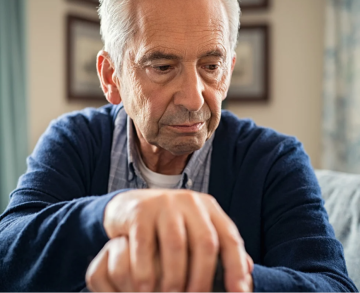
In Honor of National Mental Health Awareness Month
As we age, it’s common to experience changes in our physical health, energy levels, and daily routines. Slower movement, occasional forgetfulness, or needing more rest can be expected parts of the aging process. But what happens when these changes start to affect someone’s mood, sense of purpose, or ability to enjoy life?
During National Mental Health Awareness Month, it’s important to bring attention to an often-overlooked issue: depression in older adults. Depression is not a normal part of aging, yet it affects millions of seniors, and often goes undiagnosed and untreated.
Why Depression in Seniors Is Often Missed
Depression in older adults can look different from what it does in younger people. Instead of expressing sadness, seniors may:
- Complaints of physical aches and pains with no apparent cause
- Withdraw from social activities or hobbies they once enjoyed
- Show a lack of interest in eating or changes in sleep patterns
- Seems unusually tired, irritable, or forgetful
- Appear anxious or worried without a specific reason
Because these symptoms can mimic other age-related conditions, they’re sometimes dismissed by families or even healthcare providers as “just part of getting older.”
What Puts Seniors at Risk for Depression?
Several factors can increase the likelihood of depression in seniors, including:
- Loss of a spouse or close friends
- Chronic illness or disability
- Limited mobility or independence
- Isolation or loneliness
- Transitions to new living situations
At Hope Senior Home Care, we frequently observe how these life changes impact not only physical health but also emotional well-being. Being attentive to signs of depression can make a significant difference in the life of a loved one.
What You Can Do as a Family Member or Caregiver
- Start the Conversation
Ask your loved one how they’re feeling. Let them know it’s okay to talk about emotions—even the hard ones. - Watch for Warning Signs
If you notice changes in behavior, appetite, sleep, or mood, don’t dismiss them. Keep a journal or record to share with a healthcare provider. - Encourage Professional Help
Gently suggest speaking with a doctor or mental health professional. Many seniors benefit from counseling, support groups, or medication. - Stay Connected
Regular social interaction—whether with family, friends, or caregivers—can significantly improve one’s mood and reduce feelings of loneliness. - Consider In-Home Care Support
A professional caregiver can provide companionship, help with daily routines, and offer much-needed emotional encouragement.
Hope for Better Days Ahead
This National Mental Health Awareness Month, let’s take a closer look at the emotional health of the seniors we love. Recognizing the signs of depression isn’t always easy, but with compassion, attention, and the proper support, healing is possible.
At Hope Senior Home Care, our team is trained to identify emotional changes in our clients and work closely with families to ensure they get the support they need, mind, body, and spirit.
If you’re concerned about the mental health of a senior loved one, we’re here to help. Please feel free to contact us today to find out how in-home care can make a significant difference.

